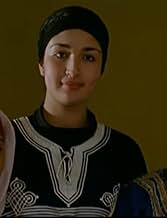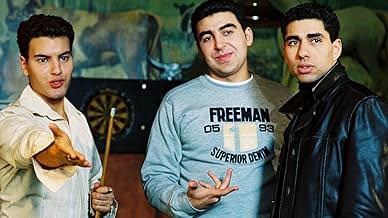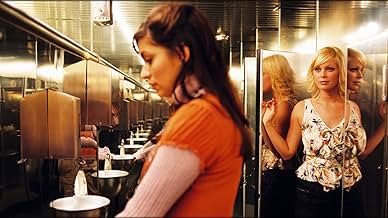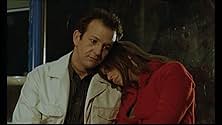Shouf shouf habibi!
- 2004
- 1h 29min
NOTE IMDb
6,1/10
2,8 k
MA NOTE
Ajouter une intrigue dans votre langueAbdullah 'Ap' Bentarek is happy that his father Ali moved to the Netherlands, but the boy has lousy friends who are his partners in crime, and unrealistic expectations at the employment offi... Tout lireAbdullah 'Ap' Bentarek is happy that his father Ali moved to the Netherlands, but the boy has lousy friends who are his partners in crime, and unrealistic expectations at the employment office.Abdullah 'Ap' Bentarek is happy that his father Ali moved to the Netherlands, but the boy has lousy friends who are his partners in crime, and unrealistic expectations at the employment office.
- Réalisation
- Scénario
- Casting principal
- Récompenses
- 5 victoires et 3 nominations au total
Zohra 'Flifla' Slimani
- Khadija Bentarek
- (as Zorah Slimani Sebouba)
Avis à la une
"Shouf shouf habibi" is a comedy about the Moroccan family Bentarek, whose kids are integrated in the Dutch society to a varying degree.
The interpretation of the movie cannot be seperated from the Dutch political situation of that time, not long after the murder in 2002 on the politician Pim Fortuyn, the first politically oriented murder in Holland since a long time.
Before that time criticism on immigrants was frequently interpreted as a sort of racism. Immigrants were mainly seen as victims. At that time immigrants were all too often stereotyped as maladjusted and causing problems. At the present day, with the woke movement, a return to the initial situation seems to be occuring.
At the time of release there was criticism on the film from the Moroccan community. The film should be politically incorrect (or, at that time, it was maybe better to call the film politically too correct). This criticism is correct if we just look at the main character Abdullah, who isn't the ideal son in law, too say the least. The criticism is incorrect if we look at the whole Bentarek family.
The film would have been more balanced if for example Samir (the oldest brother of Abdullah) or Leila (his sister) had had an equally important role as Abdullah. In that case the film however would have also been less funny. With Abdullah in the lead the Bentarek family sort of becomes a multi cultural "Flodder" (1986, Dick Maas).
According to Shakespeare "all''s well that ends well" and in the end Abdulah is a railway guard with a permanent position. A more assimilated job is hardly conceivable. The transition from a a bridegroom on the run to this permanent position does however happen a bit suddenly.
The interpretation of the movie cannot be seperated from the Dutch political situation of that time, not long after the murder in 2002 on the politician Pim Fortuyn, the first politically oriented murder in Holland since a long time.
Before that time criticism on immigrants was frequently interpreted as a sort of racism. Immigrants were mainly seen as victims. At that time immigrants were all too often stereotyped as maladjusted and causing problems. At the present day, with the woke movement, a return to the initial situation seems to be occuring.
At the time of release there was criticism on the film from the Moroccan community. The film should be politically incorrect (or, at that time, it was maybe better to call the film politically too correct). This criticism is correct if we just look at the main character Abdullah, who isn't the ideal son in law, too say the least. The criticism is incorrect if we look at the whole Bentarek family.
The film would have been more balanced if for example Samir (the oldest brother of Abdullah) or Leila (his sister) had had an equally important role as Abdullah. In that case the film however would have also been less funny. With Abdullah in the lead the Bentarek family sort of becomes a multi cultural "Flodder" (1986, Dick Maas).
According to Shakespeare "all''s well that ends well" and in the end Abdulah is a railway guard with a permanent position. A more assimilated job is hardly conceivable. The transition from a a bridegroom on the run to this permanent position does however happen a bit suddenly.
This is supposed to be a comedy about Moroccan people trying to settle down in the Netherlands, and trying to make some money the easy way. Indeed there are one or two funny scenes, but on the whole there's too little humor to make this film a comedy: no smiles, no belly-laughs, no tongue-in-cheek jokes. The acting is flat and unconvincing, the filming is unimaginative. If you'd like to see a film about the clash between Islam and European culture, the generation gap between the immigrants and their children you'd better go and see 'East is East'. 'Shouf shouf habibi', hyped as the 'First Dutch Moroccan Film Ever', will not go down in my history book. 4/10
I laughed and almost cried about this movie. Its a typically Dutch made movie for which one needs a bit of knowledge about dutch culture. A Film you most see. As a member of a etnic minority I saw a lot of simularity in settling and about intergration and its difficulty. I read a comment about this movie being Dull,´Well´, then Dutch culture has its dull sides, are you willing to see beyond!
This movie is meant to relax the tensions built up in the dutch society between the 'natives' and the immigrants, in this case Marrocans.
The story revolves around a Marrocan family which tries to start over their lives in the Nethelands with all cultural differences and prejudices depicted with a comical note to it. This film was well received for both audiences, dutch and immigrants.
The intro movie was hilarious, but the more the movie advanced, so did the seriousness of the story. I liked this one, but I still miss the artisticness that some of the French or Japanese movies have. It seems that every movie to come out of Holland must have a comic tone to it to make it more acceptable for the masses.
The story revolves around a Marrocan family which tries to start over their lives in the Nethelands with all cultural differences and prejudices depicted with a comical note to it. This film was well received for both audiences, dutch and immigrants.
The intro movie was hilarious, but the more the movie advanced, so did the seriousness of the story. I liked this one, but I still miss the artisticness that some of the French or Japanese movies have. It seems that every movie to come out of Holland must have a comic tone to it to make it more acceptable for the masses.
Albert Ter Heert does a marvelous job in showing the viewers the inside of a sensitive issue in the Netherlands - integration. A heart warming and funny, bitter-sweet story with high-octane entertainment; Shouf Shouf Habibi enriches the viewer with insight into the struggle of a traditional Moroccan family trying to integrate into Dutch society, while maintaining their "identity" as well. An all-too-familiar scenario that occurs in every nation on earth; integrating into a society that neither understands nor fully accepts you is a challenge that every immigrant must face. The Dutch and Moroccan actors in this movie were most genuine in their presentation of the topic. It's an eye-opener to the ubiquitous intolerance of the unfamiliar in every society, but is presented in a light-hearted, enjoyable way that both educates and entertains. A delight to the senses.
Le saviez-vous
- AnecdotesShot in 25 days.
- ConnexionsFeatured in Zomergasten: Épisode #17.6 (2004)
- Bandes originalesHabibi
Performed by Angel Tears
Written by Momi Ochion
Courtesy of LoveCat Music
Meilleurs choix
Connectez-vous pour évaluer et suivre la liste de favoris afin de recevoir des recommandations personnalisées
- How long is Hush Hush Baby?Alimenté par Alexa
Détails
- Date de sortie
- Pays d’origine
- Site officiel
- Langues
- Aussi connu sous le nom de
- Hush Hush Baby
- Lieux de tournage
- Sociétés de production
- Voir plus de crédits d'entreprise sur IMDbPro
Box-office
- Budget
- 800 000 € (estimé)
- Montant brut mondial
- 2 801 588 $US
- Durée
- 1h 29min(89 min)
- Couleur
- Mixage
- Rapport de forme
- 1.66 : 1
Contribuer à cette page
Suggérer une modification ou ajouter du contenu manquant















